
|
|
|
|
|
| |
|
|
|
SHIFT Newsletter November 2020: Cultural leadership
|
| |
|
|
|
| |
|
|
|
| SHIFT – Sharing Initiatives for Training is an Erasmus+ funded strategic partnership project, bringing together several cultural networks with the ambition to contribute to a better and more sustainable future as recognised in the UN Sustainable Development Goals (SDGs). SHIFT aims to develop training for cultural leaders on the topics of environmental sustainability, gender and power relations, inclusion, and cultural leadership. |
| |
|
|
|
|
| |
This newsletter has been produced by the Trans Europe Halles - European network of citizen- and artist-initiated cultural centres, leading SHIFT partner on the topic of cultural leadership, and in collaboration with EMC, project coordinator. More information about SHIFT can be found on shift-culture.eu.
Do you want to share your own initiatives on cultural leadership with us?
Contact Fairooz Tamimi at
→ fairooz@teh.net |
| |
|
|
|
|
|
|
|
|
|
Cultural leadership. State of the arts
|
| |
|
|
|
| |
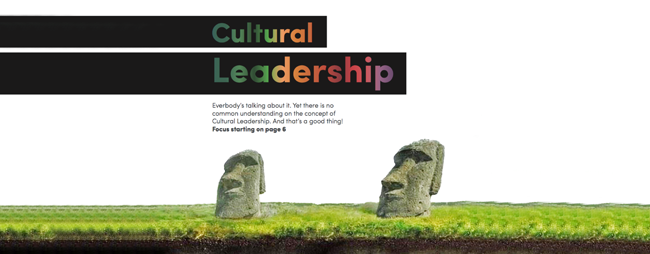
|
|
Cultural Leadership is the object of a growing chaos of perceptions and understandings. This special issue of Arts Management Quarterly offers a useful introduction to the topic. Its curators aim at exploring the concept by offering an international perspective, beyond western academic conceptualisations and into the experiences and circumstances of arts institutions and cultural professionals in different countries and arts sectors. The publication explores Cultural Leadership through the individual and personal approaches of practitioners and researchers grounded in concrete working realities, professional biographies and regional contexts. All contributions independently point in a similar direction: the center of attention turns away from the visionary leader and towards a community-oriented understanding of shared leadership that does not have to be neutral or universal, but is aware of its subjectivity and dependence on group identities and values. It is a new figure, adaptable, able to foster relationships, share power and forgive failure. As such, leadership is not a position, but a practice that can build shared beliefs, assumptions, structures and practices towards a desired future.
| | | | | | |
| |
|
|
|
|
|
The concepts of cultural leadership
|
| |
|
|
|
| |
|
Cultural leadership now and then
|
| |
Cultural leadership is a shifting and evolving concept. In this interview Hilary Carty, one of the most prominent voices in cultural leadership in the UK and abroad, discusses the changes in cultural leadership, the relationship between governance and diversity as well as trends in leadership training for the cultural sector. The interview traces the evolution of cultural leadership through Carty’s personal experience as cultural manager in the UK. According to the author, cultural leaders are today in charge of organisations in shifting environments, and have acquired a public profile. In the last decade, the understanding of cultural leadership has shifted towards a multi-disciplinary figure, expert in a set of different cultural sectors. Society is also recognising the influence of issues such as diversity and populism for cultural leadership and cultural organisations.
| | | | | | |
| |
|
|
|
|
|
|
|
|
| |
|
A cultural leadership reader
|
| |
This reader aims at making the reflections of cultural practitioners more visible and accessible. The publication collects a series of articles by scholars and practitioners. At the front you will find a commentary that sets the context for leadership and leadership development in the sector and reflects on all the contributions, identifying themes that help organise and make sense of how to think about cultural leadership. In the following chapters practitioners write about their experiences of leadership within the cultural sector. Through their reflections, we recognise that there are many ways of exercising, experiencing and indeed ‘writing’ cultural leadership. In the sixteen chapters of the volume, invited authors explore the relations between leadership and race, relationships, partnerships, improvisation, practical knowledge, crisis, and so on, offering a wide and rich perspective on the topic.
| | | | | | |
| |
|
|
|
|
|
|
|
|
|
|
| |
|
|
| |
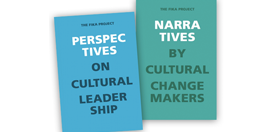
|
|
Perspectives on Cultural leadership - FIKA project
Perspectives on Cultural Leadership is not a manual for cultural leaders. The writers involved do not possess identical views on what cultural leadership is or does, and the book by no means covers all the areas of expertise that a cultural leader ought to be familiar with. The book seeks to open up discussion by offering thought-provoking perspectives on some of the waters that cultural leaders are obliged to navigate these days. The volume draws attention to the challenges and opportunities cultural leaders are faced with, and also to the hidden knowledge held by those working in the field. In particular, the volume focuses on the leaders of smaller cultural organisations that in some cases are relatively new and that aim at generating social, cultural and artistic value.
| | | | | | |
| |
|
|
|
|
|
|
| |
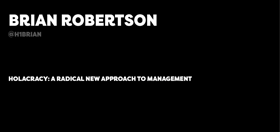
|
|
Holacracy: A Radical New Approach to Management
In this TEDxTalk, Brian Robertson briefly introduces the concept of Holacracy: a new way to interact in organisations to answer environmental complexity. This system is rooted in the autonomous actions of the members of the organisation within a framework of clear rules and without a management hierarchy.
Holacracy shifts some key aspects of organisational management: from static job descriptions to dynamic roles; from delegated authority to distributed authority; from large scale re-organisations to rapid governance interactions; from alignment via politics to transparent rules, set in a constitution. Through this system, Holacracy allows the development of an emergent and undetermined order, constantly changing, helping organizations and their members express their purpose and answer to complexity.
| | | | | | |
| |
|
|
|
|
|
|
|
|
|
| |
|
|
| |
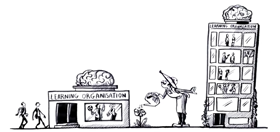
|
|
Introduction to learning organisations
This short video presents and provides graphic examples of the main aspects of learning organisations. A learning organisation encourages personal mastery and cultivates open feedback to see problems and opportunities on all levels. Most of learning organisations share the same six characteristics. The short introduction provided by this video helps cultural organisations in grasping the main concepts of learning and can guide them in understanding how to shift towards this model of organisation.
| | | | | | |
| |
|
|
|
|
|
|
| |
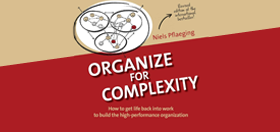
|
|
Organise for Complexity
Managers, professionals and change agents in cultural organisations, like in many other profit or non-profit organisations, are today dealing with increasing environmental complexity. In this presentation, the author argues that in order to address these issues, these organisations should develop towards forms robust for complexity, as well as fit for human beings. You will learn about concepts that allow you to design entire organisations for complexity, regardless of size, age, industry, country or culture. In particular, the presentation introduces organisational models based on team-based organisations, networked organizations, as well as core organisational design principles and system-thinking approaches.
| | | | | | |
| |
|
|
|
|
|
|
|
|
|
|
|
| |
|
|
| |

|
|
How to lead design thinking
Design thinking has been widely promoted as a framework useful for organisations, institutions and teams to develop new design concepts. This article aims at discussing the difficulties of implementation of this approach, and the role of leaders external to the design team in guiding this shift. Team members may in fact be used to be told to be rational and objective, looking for pragmatic and rapid solutions; they have difficulties in being open to iterative prototyping, testing, revisions and failures: in short, to divergent thinking. On the basis of empirical research on more than two dozens of major design-thinking projects, the authors explored the actions of senior executives to understand which practices that can foster and support design thinking projects towards success.
| | | | | | |
| |
|
|
|
|
|
|
| |
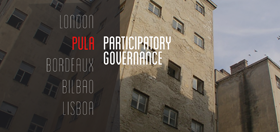
|
|
Origins of spaces. Participatory governance toolbox
Partners from five European countries worked together for three years, sharing their existing know-how and exploring new practices related to CoWorking ecosystems, generating a shared toolbox for cultural leaders. Among these guidelines, the toolbox on participatory governance focuses on deepening democratic engagement through the participation of citizens in the processes of governance within the state or local community. The idea is that citizens should play more direct roles in public decision-making or at least engage more deeply with political issues.
| | | | | | |
| |
|
|
|
|
|
|
|
|
|
| |
|
|
| |
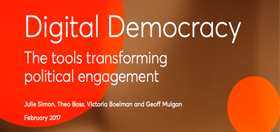
|
|
Digital Democracy The tools transforming political engagement
This paper shares lessons from Nesta’s research into some of the pioneering innovations in digital democracy, that cultural leaders can adopt to innovate their engagement with stakeholders and audiences. The document inquires: How and to what extent are digital tools being used by parliaments, municipal governments and political parties to engage citizens to improve the quality and legitimacy of their decision-making? What can be learned from recent digital democracy initiatives about how to get the most from digital tools and create an effective platform for participation? The case studies look at initiatives which aim to engage citizens in deliberations, proposals and decision-making. While the paper mostly focuses on the role of digital democracy for parliaments, local governments and parties, the cases and the lessons it draws are also useful for the digitalisation of the participatory governance of cultural organisations.
| | | | | | |
| |
|
|
|
|
|
|
| |
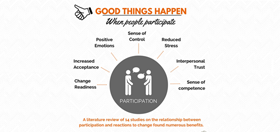
|
|
Employee Participation in Organisational Change
| This two-part series of articles provides useful reflections for leaders on the role of employee participation in organisational change. The first article focuses on the general concepts of participation, organisational change and the relations between the two. It provides a participation framework in order to support leaders of change in aligning their intentions for participation, the envisioned role of participants and the appropriate participation methods. The second article overviews practices and methods leaders can experiment for organisational change processes with a participatory approach. Experimentation with the different methods will allow the leaders of change to understand their ability in each of them and their fitness for their desired outcomes. Overall, these articles provide a useful set of concepts, tools and techniques for participatory approaches towards organisational change. |
| |
| ► Read 1st article |
| |
| ► Read 2nd article |
| |
|
|
|
|
|
|
|
|
|
| |
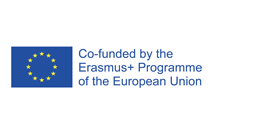
|
|
| The SHIFT Project is co-funded by the Erasmus+ programme of the European Union. |
| |
|
|
|
|
| |
| The EMC is a regional group of the |
 |
|
| The EMC is supported by |
 |
|
|
|
|
|
|
|
|
| |
| |
This communication reflects the views of the EMC only and the European Commission cannot be held responsible for any use which may be made of the information contained therein.
|
|
|
|
| |
You have received this newsletter because your are on the mailing list of the European Music Council. If you no longer wish to receive any emails from the European Music Council, please reply to this email writing "unsubscribe newsletter" in the subject line.
|
|
|
|